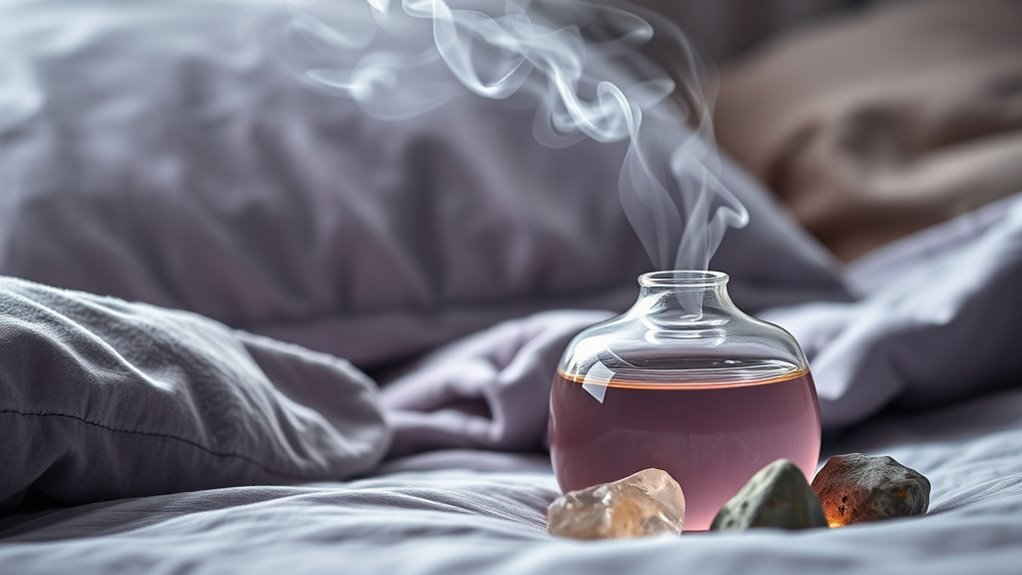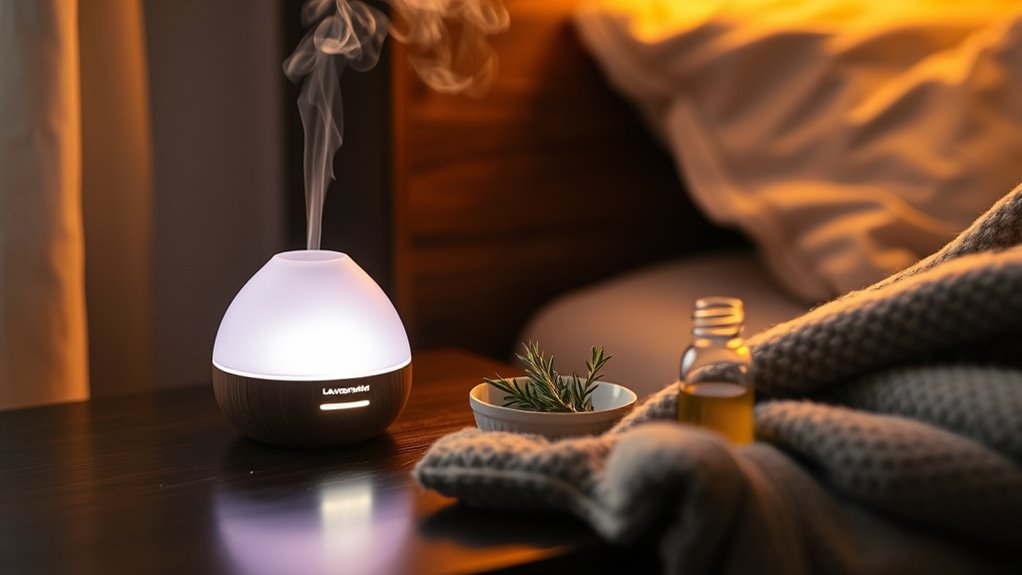To enhance your vivid dreams, try using essential oils like lavender for relaxation and peppermint or mugwort to stimulate mental activity before sleep. Diffusing these aromas or applying them to pulse points can signal your brain to enter REM sleep, making dreams more vivid and memorable. Combining aroma therapy with good sleep habits boosts your chances of more intense dreaming. Keep exploring, and you’ll discover even more ways to tap into your dream world.
Key Takeaways
- Certain essential oils like mugwort and peppermint can stimulate brain activity to enhance REM sleep and dream vividness.
- Lavender promotes relaxation, helping you fall asleep faster and enter REM stages more readily for vivid dreaming.
- Diffusing aromas such as rosemary or sandalwood before sleep can condition the brain to associate scent cues with vivid dreams.
- Combining aromatherapy with good sleep hygiene, like maintaining a consistent schedule, amplifies REM and dream clarity.
- Regular use of specific essential oils may condition the brain to link these scents with heightened REM activity and more memorable dreams.

Have you ever wondered how scents can influence your dreams? It’s a fascinating thought, especially considering how powerful our sense of smell is in shaping our subconscious experiences. When you use scent therapy, you’re not just filling your space with pleasant aromas—you’re actively engaging your brain’s pathways to potentially enhance your sleep cycle and promote vivid dreams. Scent therapy works by introducing specific essential oils that can target the areas of your brain responsible for REM sleep, where most dreaming occurs. By carefully selecting these oils, you may be able to influence the intensity and clarity of your dreams, making them more memorable and immersive.
Your sleep cycle naturally fluctuates between various stages, with REM sleep playing a vital role in dreaming. During this stage, your brain processes emotions, consolidates memories, and explores creative scenarios, all of which contribute to the vividness of your dreams. Using scent therapy can help nudge your brain into REM more effectively. For instance, some essential oils have properties that promote relaxation and deepen your sleep, which in turn can extend or enhance your REM periods. When your sleep cycle is optimized, you’re more likely to experience those intense, detailed dreams that leave a lasting impression.
Optimizing your sleep cycle enhances REM dreaming, making your dreams more vivid, detailed, and memorable.
Choosing the right scents is key. Lavender, often associated with relaxation, can help you fall asleep faster and reach REM sleep more smoothly. However, for more vivid dreams, oils like mugwort or peppermint might be more effective, as they are believed to stimulate the brain and heighten mental activity. You can diffuse these scents in your bedroom or apply diluted versions to your pulse points before bed. The goal is to create an environment that signals your brain to enter a state conducive to dreaming vividly. Consistency is important—regular use of scent therapy can condition your brain to associate certain aromas with heightened REM activity.
Additionally, understanding the engagement of sensory pathways can help you select the most effective essential oils for dream enhancement. Keep in mind, though, that scent therapy isn’t a magic bullet. It’s a complementary approach that works best when combined with good sleep hygiene—like maintaining a regular sleep schedule, reducing screen time before bed, and creating a calm sleeping environment. When you integrate these practices, the scents you choose can become powerful tools in fine-tuning your sleep cycle and *accessing* more vivid, memorable dreams. So, next time you prepare for bed, consider how the right aroma could transform your nightly dreams into more colorful, immersive experiences.
Frequently Asked Questions
Can Aromatherapy Improve Dream Recall?
You might find that aromatherapy can improve dream recall by enhancing your sleep environment and promoting dream enhancement. Using calming essential oils like lavender or chamomile before bed can help you relax and achieve deeper REM sleep, where vivid dreams occur. This relaxed state may increase your awareness of dreams upon waking. Consistent use of aromatherapy creates a peaceful sleep environment, making it easier to remember your dreams more clearly.
Are There Any Safety Concerns With Essential Oils During Sleep?
Did you know that over 10% of essential oil users experience skin irritation? When using essential oils during sleep, you should consider diffusion safety to avoid overwhelming your senses and potential respiratory issues. Always dilute oils properly and avoid direct skin contact to prevent irritation. Confirm your sleep environment remains safe by choosing high-quality oils, ventilating the room, and following guidelines to enjoy aromatherapy without risks.
How Long Before Sleep Should I Use Aromatherapy for Vivid Dreams?
You should apply your aromatherapy about 15 to 30 minutes before sleep, allowing the scent to settle and create a calming environment. Timing strategies help maximize the effects, so avoid rushing. Use essential oils with gentle scent intensities to prevent overwhelming your senses. This way, the aroma primes your mind for vivid dreams without disrupting your sleep cycle, helping you enjoy a more restful and dream-rich night.
Do Individual Scents Affect Dream Themes Differently?
Research suggests that scent specificity influences dream themes, supporting the aroma dream correlation theory. You might notice that certain scents evoke specific emotions or memories, which can shape your dreams uniquely. Different aromas, like lavender or sandalwood, could trigger varied dream content based on personal associations. As a result, individual scents do affect dream themes differently, making scent selection a personalized tool for potentially influencing your dream experiences.
Can Aromatherapy Replace Other Sleep Improvement Methods?
Aromatherapy can be a helpful complementary therapy, but it shouldn’t replace established sleep hygiene practices or other sleep improvement methods. You might find it enhances relaxation and creates a calming environment, yet maintaining consistent sleep schedules, limiting screen time, and managing stress are essential for better rest. Use aromatherapy alongside these strategies for a more holistic approach, but don’t rely solely on it for your sleep health.
Conclusion
So, next time you find yourself wandering through a dreamscape more vivid than reality, just sprinkle some essential oils and thank your newfound REM expert. Who knew that a whiff of lavender or a dash of mugwort could turn your nightly snooze into a surreal adventure? Just remember, with all this aromatic wizardry, you might never want to wake up—unless you’re craving a break from your nightly blockbuster. Sweet dreams, or should I say, scented nightmares?









